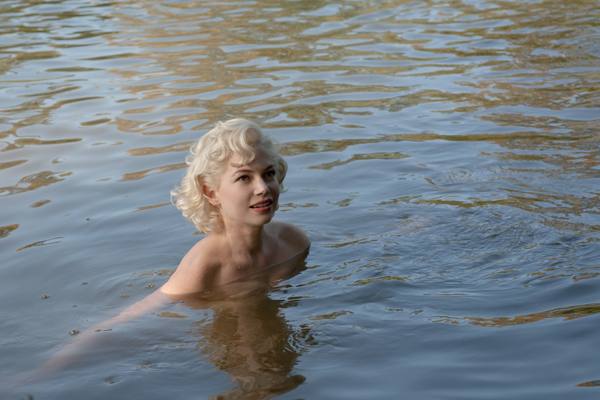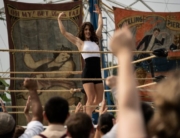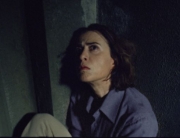Directed by Simon Curtis
Produced by David Parfitt & Harvey Weinstein
Written by Adrian Hodges,based on the diaries by Colin Clark, The Prince, the Showgirl, and Me and My Week with Marilyn
Released by the Weinstein Company
USA/UK. 101 min. Rated R
With Michelle Williams, Eddie Remayne, Kenneth Branagh, Julia Ormond, Dominic Cooper, Emma Watson, Zoë Wanamaker, Dougray Scott, Judi Dench & Derek Jacobi
One of the most intrepid American actresses of her generation, actress Michelle Williams takes on the formidable challenge of playing Marilyn Monroe. As if to quench a skeptic’s curiosity, My Week with Marilyn opens with Williams as the screen goddess crooning a version of “When Love Goes Wrong.” Yes, there’s extra padding here and there in her wardrobe, but as many a drag queen has discovered, it takes more than peroxide and flaming red lipstick to capture the actress’s knowing innocence. Williams has done her homework. She certainly has Monroe’s smile and the wispy, little-girl voice. Her mannerisms are effortless (unlike the script), so after the first couple of minutes, comparisons are moot. In contrast, Theresa Russell, as the Monroe-like actress in the long-winded Insignificance (1985), is too studious in mimicking the actress’s speech pattern and timbre.
Based on two memoirs by Colin Clark, the film covers the troubled 1956 production of the first film produced by Marilyn Monroe Productions (after her contract with 20th Century Fox had expired), a piece of fluff called The Prince and the Showgirl, based on a play by Terrance Rattigan. Filmed in the U.K. at Pinewood studios, its production history has taken on mythic proportions, like most of Monroe’s later films. In the vein of many biopics, the script simplifies the on-set conflict between Monroe and her co-star and rattled director, Sir Laurence Olivier: the more instinctual approach espoused by Lee Strasberg (the grossly over-used term “the method”) vs. English stage technique, which emphasized speech (finding the melody within the line, for example) as well as both the exterior and the interior behavior of a character.
Essentially, two directors battle for control on the sound stage: Olivier and Monroe’s acting coach, Paula Strasberg (Zoë Wanamaker). Of all the real-life figures here, she comes off with less dignity—meddlesome and territorial. Off the set, Strasberg lowers herself before her protégée, praising her as the greatest actress that’s ever been. Before the cast and crew, she excuses Monroe’s perpetual tardiness; the artist’s not ready, though Monroe keeps her colleagues waiting for hours daily throughout the shoot. True to the folklore, Strasberg directs Monroe to think of Frank Sinatra and Coca-Cola for a specific line reading. Whatever it took, it worked.
After watching dailies of Prince, her manager Milton Greene (Dominic Cooper) declares, “When Marilyn gets it right, there’s no use watching anyone else.” How true. In the 1957 film, your eyes never stray from her even though almost of all of her scenes are opposite Olivier, who was considered the greatest stage and film actor of his time. She’s luminous and endearing as a love-struck chorus girl seduced by his caddish Eastern European prince. And much in the same way, Williams dominates the new film, even though she’s surrounded by an embarrassment of riches. That’s mainly because the screenplay reduces Olivier to a one-dimensional, Bard-quoting ham, and as the acting titan, Kenneth Branagh doesn’t hold back on the theatrical flourishes. Though his temper makes him the film’s heavy, Olivier delivers some of the best wisecracks: “Teaching [Monroe] how to act is like teaching Urdu to a badger.”
As the film shifts its focus to the relationship between Monroe and the production’s third assistant director, 23-year-old-year Oxford grad greenhorn Colin Clark (Eddie Redmayne), Olivier’s reduced to a mere supporting player. Likewise, Judi Dench, as Dame Sybil Thorndike, has little to do but to observe. Strangely, Dougray Scott turns up briefly as Arthur Miller, who had just married Monroe. Miller has maybe four or five lines and departs at the halfway point. Yet, during the actual shoot, his presence on the set wasn’t only to wipe away his wife’s insecurities. He also befriended Olivier, encouraging him to take on the role in John Osborne’s play The Entertainer. You wouldn’t know that here.
The film’s framed through Colin’s point of view. (He went on to become a documentary filmmaker and died in 2002.) He becomes her spirit-lifting confidant and guide to Heritage England, as well as platonically sharing her bed during a troubled night. She clearly takes advantage of his fanboy gaze, and he basks in her attention and the proximity to her fame—whether in Piccadilly or Eton, she attracts a mob of admirers. But the second half devotes too much attention to Colin’s delusional crush, tirelessly trying to convincing the audience, that’s already in the know, that their relationship has a ghost of a chance. (Uh, we know how this ends already.) Because he’s ever striving, ever efficient, and, as written here, one gosh-golly note, Colin fades in the background, regardless of who else is on screen. This is true whether he’s with Monroe or with Julia Ormond as a pragmatic and lucid Vivien Leigh, a performance tinged with bitterness—Leigh was married to Olivier at the time and had originated on stage the role now occupied by Monroe in Prince.
Though Monroe’s self-absorbed and capricious, the script carefully doesn’t make her too much of a handful and thereby never challenges her icon status—the PBS documentary Making the Misfits, on the production of her last film, doesn’t hold back on her behavior. And yet for all of the on-set furor over acting technique, Williams, ironically, stakes a claim for a third way, delivering both a vivid and concise interior and exterior performance. Fittingly for a handsome and literal depiction of the 1950s, she more than fulfills the physical requirements and looks the part (as much as humanly possible), but more impressively, she brings a pulse to the script, which moves from quips to declarations, making one methodical pop psychology revelation after another.







Leave A Comment